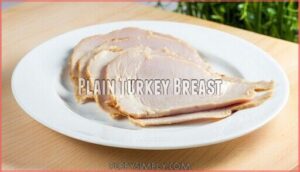This site is supported by our readers. We may earn a commission, at no cost to you, if you purchase through links.
 Your dog can eat sliced ham occasionally, but it’s not the best choice.
Your dog can eat sliced ham occasionally, but it’s not the best choice.
While ham isn’t toxic, it’s packed with sodium and fat that can upset your pup’s stomach or trigger pancreatitis.
A small bite won’t harm most healthy dogs, but regular consumption poses real risks.
The high salt content can strain their kidneys, and the fat can lead to digestive troubles.
If you’re determined to share, choose lean, unseasoned varieties and keep portions tiny.
Think of ham as junk food for dogs – fine as a rare treat, but not part of their regular diet.
There are safer ways to spoil your furry friend.
Table Of Contents
- Key Takeaways
- Risks of Sliced Ham
- Can Dogs Eat Sliced Ham
- Safe Feeding Practices
- Alternatives to Sliced Ham
- Preventing Ham Access
- Frequently Asked Questions (FAQs)
- Is sliced deli ham ok for dogs?
- What happens if my dog eats a slice of ham?
- Can I give leftover ham to my dog?
- Can pregnant dogs eat sliced ham safely?
- What happens if puppies eat sliced ham?
- Are ham bones safe for dogs ever?
- Can diabetic dogs have sliced ham treats?
- How much sliced ham causes sodium poisoning?
- Conclusion
Key Takeaways
- You can give your dog sliced ham occasionally, but it’s not recommended – The high sodium and fat content can cause stomach upset, pancreatitis, and other health issues.
- Even small amounts pose risks – Just one slice contains dangerous sodium levels that can lead to dehydration, kidney strain, and potentially life-threatening complications.
- Choose safer alternatives instead – Plain turkey breast, cooked pumpkin, green beans, or unsweetened cranberries provide better nutrition without the health risks.
- If you must share, use extreme caution – Select lean, unseasoned cuts, cook thoroughly, keep portions tiny, and monitor your dog closely for any signs of digestive distress.
Risks of Sliced Ham
While sliced ham might seem like a tasty treat for your dog, it poses several serious health risks that every pet owner should understand.
The high sodium content, excessive fat levels, and potential for pancreatitis make sliced ham a poor choice for canine consumption.
High Sodium Content
Sliced ham contains around 1,200 mg of sodium per 100 grams, far exceeding your dog’s daily needs.
Just one slice of ham packs dangerous sodium levels that can poison your dog.
This excessive salt content can trigger sodium ion poisoning, causing dehydration risks and dangerous electrolyte imbalance.
You’ll notice increased thirst and urination as early warning signs.
Severe cases lead to fluid accumulation, salt toxicity symptoms, and potentially life-threatening complications requiring immediate veterinary intervention, which can be summarized as a life-threatening situation.
High Fat Content
Most sliced ham contains 8-12 grams of fat per 100 grams, creating serious Obesity Concerns for dogs.
This High Fat Content includes Saturated Fats that are difficult for canines to process.
The Caloric Density exceeds 150 calories per 100 grams, making ham a Pancreatitis Trigger that causes Digestive Distress in sensitive dogs.
Plain turkey and chicken are safer protein options for dogs.
Pancreatitis Risk
High fat content in ham creates a perfect storm for pancreatic inflammation in your dog.
The pancreas struggles to produce enough digestive enzymes to break down excess fat, leading to dangerous swelling.
High salt content also poses a significant risk to dogs.
Key pancreatitis risks include:
- Breed predisposition makes some dogs more vulnerable
- Sodium and fat combination overwhelms the pancreas
- Veterinary intervention becomes necessary for severe cases
Digestive Issues
Your dog’s digestive system wasn’t designed to handle ham’s high fat content and salt levels.
Your dog’s stomach simply can’t handle ham’s heavy fat and salt combo.
Fat digestion becomes challenging, leading to gastrointestinal distress like vomiting and diarrhea.
Salt sensitivity disrupts gut bacteria balance, causing further digestive issues.
These problems can escalate pancreatitis risk, making veterinarian advice essential if symptoms appear.
Can Dogs Eat Sliced Ham
While many pet owners wonder "is ham safe for dogs," the answer isn’t straightforward.
You can give your dog small amounts of sliced ham occasionally, but it’s not an ideal treat.
Ham for dogs poses several concerns that make it a risky choice for regular feeding.
The biggest issues with sliced ham dogs face include:
- Ham nutrition lacks balance for canine dietary needs while packing excessive sodium and fat
- Sodium toxicity becomes a real threat when dogs consume too much processed meat
- Gluten concerns may affect sensitive dogs, as some hams contain wheat-based fillers
Safe portions mean tiny pieces given rarely, not regular servings.
Ham risks dogs encounter include digestive upset, weight gain, and potential poisoning from high salt content.
Raw bones pose dangers through splintering and choking, but cooked ham bones are even more brittle.
Bone hazards from ham bones create additional dangers through splintering and choking risks.
Your dog’s health depends on moderation in regards to dog diet ham decisions.
Safe Feeding Practices
If you decide to offer your dog sliced ham, you’ll need to follow strict safety guidelines to minimize health risks.
The key is choosing the right type of ham, preparing it properly, keeping portions tiny, and watching your dog closely for any signs of trouble, which are all complete concepts to consider when giving ham to your dog.
Choose Lean Cuts
When selecting ham for dogs, lean cuts make all the difference. Choose unprocessed varieties over deli slices to reduce sodium and preservatives. Trim visible fat to prevent pancreatitis. Fresh, plain ham contains fewer additives than processed options, making it safer for your pet.
As a general rule, it’s best to avoid ham altogether due to the risks of gastrointestinal distress.
| Ham Type | Sodium Content | Safety Level |
|---|---|---|
| Deli Ham | 1,200+ mg/100g | High Risk |
| Fresh Ham | 400-600 mg/100g | Moderate Risk |
| Lean Trimmed | 300-500 mg/100g | Lower Risk |
| Processed | 1,000+ mg/100g | High Risk |
Fat trimming techniques involve removing visible white portions before serving. Lean meats naturally contain less fat than processed varieties. These sodium reduction methods help prevent digestive upset while still allowing occasional treats. Safe ham types include fresh, unseasoned cuts without glazes or marinades.
Cook Thoroughly
When properly cooking ham for your dog, make certain internal temperatures reach 165°F to kill pathogens like Salmonella and parasites such as trichinosis.
Proper cooking methods reduce risks associated with pork products while maintaining food safety standards.
Skip glazes, spices, and seasonings that can trigger digestive upsets. Plain preparation protects your pet’s health.
Limit Portions
Even after proper preparation, portion control matters when feeding dogs ham.
Offer only small pieces as an occasional treat – a single slice contains 167 mg of sodium, exceeding safe daily limits.
Ham’s calorie density can quickly lead to weight gain if treat size isn’t carefully managed.
Frequency matters more than you think; regular ham consumption increases health risks substantially, and portion control is crucial to mitigate these issues.
Monitor Health
Always watch your dog closely after feeding any ham for signs of ham toxicity dogs.
Look for vomiting signs, diarrhea watch indicators, appetite changes, and lethargy alert symptoms.
Monitor stool changes for greasy or abnormal consistency.
These ham dog health warning signs typically appear within hours.
Consider using a dog health monitor to track key signs.
Contact your veterinarian advice immediately if symptoms persist or worsen, as ham for dogs can cause serious complications.
Ensure you take immediate action if you notice any lethargy alert symptoms.
Alternatives to Sliced Ham
When you’re looking for safer treats than sliced ham, several dog-friendly alternatives pack nutrition without the health risks.
These options provide essential nutrients while keeping sodium and fat levels appropriate for your pet’s digestive system.
Plain Turkey Breast
Plain turkey breast stands as the gold standard among healthier alternatives to sliced ham.
This lean protein source contains substantially less sodium and fat than processed meats, making it gentler on your dog’s digestive system.
Turkey slices offer excellent digestibility factors while providing essential nutritional benefits for muscle maintenance.
Safe preparation involves cooking thoroughly without seasoning, removing skin and bones.
Proper portion control guarantees your dog enjoys this treat without health risks, ensuring a healthy alternative to processed meats and promoting a gentler digestive system.
Cooked Pumpkin
Cooked pumpkin offers excellent pumpkin benefits for your dog’s diet. This fiber-rich alternative supports healthy digestion while providing beta-carotene for coat health.
Preparation methods involve cooking plain pumpkin without seasoning or sugar. Serving sizes should remain small to prevent stomach upset.
Recipe ideas include mixing pumpkin with regular dog food or creating homemade dog treats. Potential risks include digestive issues from excessive amounts.
Pumpkin also provides essential minerals like potassium for overall wellness, and is a good source of beta-carotene for coat health, supporting healthy digestion.
Green Beans
Adding green beans to your dog’s diet brings exceptional nutritional benefits without ham’s risks.
These fiber-rich vegetables support healthy digestion while providing essential vitamins and minerals.
Simple preparation methods include steaming or serving raw, chopped into bite-sized pieces.
Creative serving ideas include mixing with regular dog food or using as training treats.
Most dogs tolerate green beans well, though potential allergies exist.
This wholesome addition enhances any dog diet naturally, with essential vitamins and healthy digestion.
Unsweetened Cranberries
Unsweetened cranberries offer cranberry benefits like antioxidants and vitamin C for your dog’s urinary health.
These tart berries make excellent dog treats when given properly, unlike ham for dogs which carries ham toxicity risks.
5 Safe Cranberry Preparation Methods:
- Fresh cranberries – Rinse and chop to prevent choking hazards
- Frozen cranberries – Thaw completely before serving as training treats
- Dried cranberries – Choose unsweetened varieties without harmful xylitol
- Cranberry puree – Blend fresh berries for easy mixing with regular food
- Homemade recipe ideas – Bake into dog-safe treats with plain ingredients
Monitor serving size carefully – cranberries’ acidity can upset sensitive stomachs.
While ham nutritional value dogs receive is questionable due to high sodium, cranberries provide safer nutrition.
Start with small amounts to gauge your dog’s tolerance.
Preventing Ham Access
The best way to prevent your dog from eating sliced ham is to keep it stored securely in closed containers or high cabinets where curious paws can’t reach.
You should also supervise your dog during family meals and teach them basic commands like "leave it" to help them resist the temptation of dropped food, which is a key part of teaching your dog to obey basic commands.
Secure Food Storage
Since dogs eat ham whenever opportunity strikes, smart storage prevents ham toxicity dogs face from counter surfing.
Use airtight containers with child locks in elevated storage areas above your pet’s reach. Organize your pantry with secure bins that lock tightly, keeping ham for dogs completely inaccessible.
Utilizing secure food storage is key to preventing accidental ingestion. Proper pantry organization and dog food safety go hand-in-hand when preventing accidental ingestion of dangerous foods.
Supervise Mealtime
During mealtime, watch your dog closely to prevent ham toxicity dogs face from sneaky snacking.
In Multiple Dog Homes, Prevent Food Guarding by feeding pets separately. Child Supervision becomes essential since kids often drop ham slices.
Fast Eating increases sodium and pancreatitis risks, so monitor portion control. Restrict Post-Meal Activity if your dog consumed ham to aid proper digestion.
Train Dogs to Resist
Teaching your dog impulse control prevents ham-stealing incidents before they happen.
Start with basic "leave it" commands using dog treats during training sessions.
Practice distraction training by placing ham nearby while rewarding your dog for ignoring it.
Scent work exercises help dogs learn to resist tempting food smells.
Consistent reinforcement methods strengthen dog behavior over time.
Explore various positive training techniques for ideal results.
Pet owner responsibility includes daily training sessions to build reliable responses around forbidden foods.
This approach ensures a well-behaved dog that can resist the temptation of forbidden foods.
Emergency Procedures
If your dog swallows ham, don’t induce vomiting unless your veterinarian instructs you to do so.
Never give activated charcoal without professional guidance. Instead, monitor symptoms like vomiting, diarrhea, or lethargy closely.
Contact your veterinarian immediately for pet poisoning concerns. Ham bone dangers include potential internal injuries.
Having CPR training helps during emergencies, but veterinary care remains essential for proper treatment and recovery.
Frequently Asked Questions (FAQs)
Is sliced deli ham ok for dogs?
Your pup’s sneaky eyes might scream "share that sandwich," but sliced deli ham’s excessive sodium and preservatives spell trouble.
You’re risking vomiting, diarrhea, or pancreatitis.
Skip it—stick to plain chicken instead.
What happens if my dog eats a slice of ham?
If your dog eats a slice of ham, monitor them closely for vomiting, diarrhea, or excessive thirst.
One slice typically won’t cause serious harm, but the high sodium and fat content may upset their stomach temporarily.
Can I give leftover ham to my dog?
Leftover ham’s sky-high sodium and fat content can trigger serious health issues like pancreatitis, vomiting, and potentially fatal sodium poisoning in your furry friend.
Can pregnant dogs eat sliced ham safely?
Pregnant dogs shouldn’t eat sliced ham due to high sodium and fat content that can worsen pregnancy complications.
The excess salt increases dehydration risk while fat may trigger pancreatitis, potentially harming both mother and puppies.
What happens if puppies eat sliced ham?
Like a ticking time bomb, sliced ham’s extreme sodium content can trigger serious health issues in puppies.
You’ll likely see vomiting, diarrhea, excessive thirst, and potentially dangerous dehydration requiring immediate veterinary attention.
Are ham bones safe for dogs ever?
No, ham bones are never safe for dogs. They splinter easily when cooked, causing choking hazards, mouth injuries, and dangerous intestinal blockages that require emergency surgery.
Can diabetic dogs have sliced ham treats?
Your diabetic pup shouldn’t indulge in sliced ham treats. High sodium and fat content can spike blood sugar and worsen diabetes complications. Choose low-sodium, diabetic-friendly alternatives instead.
How much sliced ham causes sodium poisoning?
There’s no specific amount that guarantees sodium poisoning in dogs.
It depends on your dog’s size, health, and tolerance.
Even small amounts can cause problems for tiny breeds or dogs with existing health issues.
Conclusion
Apparently, your dog’s dream of becoming a deli connoisseur must be crushed.
While you’ve learned that dogs can eat sliced ham in tiny amounts, it’s basically junk food for your furry friend.
The high sodium and fat content make it a risky treat that can trigger pancreatitis and digestive issues.
Stick to safer alternatives like plain turkey or vegetables instead.
Your dog’s health trumps their taste preferences every time.
- https://pangovet.com/?utm_source=dogster&utm_medium=article&utm_campaign=dog_eat_drink
- https://petkeen.com/fruits-vegetables-dogs-can-eat/
- https://www.purina.com/articles/dog/feeding/can-dogs-eat/ham
- https://www.dogsnaturallymagazine.com/can-dogs-eat-ham/
- https://www.akc.org/expert-advice/nutrition/can-dogs-eat-ham/















